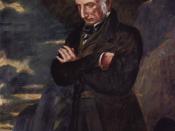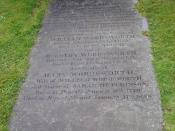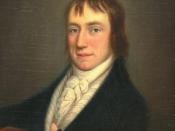William Wordsworth composed the poems Lines Composed a Few Miles Above Tintern Abbey, presenting a theme of immortality within the ruins of the church, and The World is Too Much With Us, describing the problems that humanity has brought to nature. William Wordsworth, a British poet, was originally a humanist, but broke away from this belief when he wrote Tintern Abbey, ultimately after his second visit to the actual abbey. "Wordsworth had been, in his youth, a devout follower of Godwin, who was also a humanist" (Bloom, 37). Although Wordsworth's works were admired by many, others found "the poem is irresponsible" (Herrington-Perry). Even so, the true meaning and focus behind his poems is relatively difficult to define.
Originally these ruins, Tintern Abbey, as Wordsworth tags it, were a medieval church. Five years prior to his visit to the abbey with his sister Dorothy, was his first visit which was attended alone.
He begins the poem by describing the passing time between his first and second visit. "First five years, then five summers, then five winters- makes the reader feel its length" (Napierkowski, 250). Within those five years was Bastille Day, a very significant historical event. It then goes on to describe the landscape and surroundings of the abbey, showing Wordsworth's immense imagination, and appreciation for the things around him. The abbey is the site of the ruins of the church, but Wordsworth imagines that spirits of the church now inhabit the woods, another example of his vivid imagination. William states that thoughts of his first visit have provided him with comfort along his travels to various towns and cities. Although Wordsworth's feelings on nature had evolved since his first visit to the abbey, upon his second visit he had a stronger spiritual sense, and a broader understanding on...


